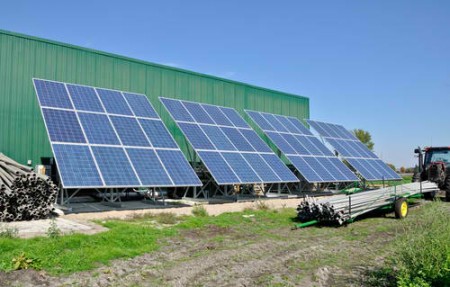By Arno Harris, National Geographic Society/Recurrent Energy
Rumors are swirling about the next shoe to drop in the campaign against renewable energy. A handful of struggling solar manufacturers are expected to announce they are joining a petition to the International Trade Commission and the US Department of Commerce (DOC). The petition is expected to allege China unfairly subsidizes solar manufacturers and is ‘dumping’ solar modules on the global market below cost (a view exacerbated by a few high profile solar company bankruptcies I previously wrote about).
A successful petition would be the first step towards imposing tariffs on solar panels imported from China. The announcement is timed to coincide with the start of Solar Power International, the US’s largest solar trade fair taking place next week in Dallas.

Let’s state plainly what’s going on here. A group of manufacturers who can’t compete with today’s solar panel prices are seeking to erect trade barriers to make the US a ‘safe market’ for their own more expensive solar panels. They want to prevent Americans from getting access to low-cost solar panels and low-cost solar electricity so they can sell their own more costly product to them instead.
This is clearly a tactic in the narrow self- interest of the manufacturers joining the petition. It’s not in the interest of American consumers. It’s not in the interest of ratepayers. It’s not in the interest of our national security. And it’s certainly not in the interest of slowing global climate change.
I’ve said it many times, but it’s worth saying again. The best thing we can do is encourage the solar industry to ruthlessly drive down the cost of solar panels. And that’s exactly what the industry has been doing with manufacturing in the US, Europe, China, Malaysia, the Philippines, and beyond. As a result, since 2008 the cost of solar panels has come down by roughly 75% with most of that coming from reductions in silicon commodity costs and manufacturing improvements.
The less solar power costs, the more favorably it compares to conventional power, and the more attractive it becomes to utilities and energy users around the globe. Today’s low cost solar panels are overturning antiquated notions about the limits of solar power and driving a massive wave of new demand for clean solar-generated electricity.
As with other high tech fields, rapid innovation and cost reduction in solar poses a challenge for those who can’t keep up. While individual company failures may be painful, it’s in the best interest of consumers for the market to remain competitive. Propping up failing companies with trade barriers would create an unhealthy market environment and ultimately discourage innovation by rewarding the laggards.
Leaving all that aside, here’s where the ‘blame China’ argument really starts to lose credibility from my perspective. First, according to the US Solar Energy Industries Association (SEIA), the US solar industry in 2010 had positive trade flow of $1.9B and was a net exporter to China by more than $240M. In other words, last year US companies sold more solar equipment to China than Chinese companies sold in the US. Solar is a global industry with a global supply chain and if one piece of that chain is impacted, everyone will be ultimately be affected.
In addition, the domestic solar industry is thriving and initiating a trade war would only be shooting ourselves in the foot at a time when we’re already facing a recession. Currently the US solar industry employs 100,000 people in the US (more than coal mining industry) and that growth isn’t in manufacturing, which accounts for less than 25% of the industry’s jobs, but in the diverse ecosystem of solar suppliers and others who sell, install, engineer and construct solar arrays and power plants.
Second, you don’t have to be much of a stock analyst to recognize that Chinese manufacturers are struggling to keep up with today’s competitive market as much as US companies are. If the companies joining the potential trade petition allege that Chinese companies benefit from unfair advantage, you’d expect to see Chinese companies earning comfortable profits while everyone else suffered. That’s just not the case. In fact, I’d argue that the signs indicate we’re likely to see some big Chinese failures in the upcoming years as the competitive marketplace exacts its toll.
My hope is that this all adds up to nothing and US trade representatives recognize that starting a trade war over solar panels would be stupid. Trade barriers would only raise the cost of solar equipment and solar power–something that is only in the interest of a small group of manufacturers who can’t keep up in today’s market. Instead we should continue to focus on growing demand and facilitating the growth of a promising and exciting new era of low cost, ubiquitous solar power.
![]() Editor’s Note: This column comes to us as a cross post courtesy of the National Geographic Society’s Great Energy Challenge. Author credit for the post goes to Arno Harris.
Editor’s Note: This column comes to us as a cross post courtesy of the National Geographic Society’s Great Energy Challenge. Author credit for the post goes to Arno Harris.